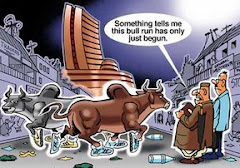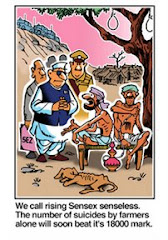
Despite opening strong, Indian equities markets shed values once again today on weak global cues and the key BSE index finished with losses of more than 150 points.
Overnight US markets closed in the green but a key index of the New York Stock Exchange actually went even below October lows before bouncing back on short covering. Asian markets too were showing gains Friday morning when Indian markets opened.
"Markets opened strong as both US markets and Asian markets were in green but the buying mood is simply not there as it is very clear that even the Euro region is into a recession," said Jagannadham Thunuguntla, head of the capital markets arm of India's fourth largest share brokerage firm, the SMC Group.
The 30-share benchmark sensitive index (Sensex) of the Bombay Stock Exchange (BSE) finished at 9,385.42, down 150.91 points or 1.58 percent from its previous close Wednesday at 9,536.33 points.
The Sensex opened strong at 9,799.25, up 262.92 points or 2.76 percent from its previous close Wednesday, hit a high of 9,836.11 but then began to slide to hit a low of 9,267.49 before inching up about 115 points to its closing value.
The broader-based 50 share S&P CNX Nifty of the National Stock Exchange (NSE) also showed a similar trend and closed at 2810.35, down 38.1 points or 1.34 percent from its previous close Wednesday at 2848.45 points.
The BSE midcap index finished at 3,216.08, down 65.19 points or 1.99 percent from its previous close Wednesday at 3,281.27 points.
The BSE smallcap index closed at 3,765.05, down 48.33 points or 1.27 percent from its previous close Wednesday at 3,813.38 points.
Except for fast moving consumer goods (FMCG) all the other 12 sectoral indices were in the red with capital goods, automobiles, metal and consumer durables showing the most losses.
Among the gainers Bharti Airtel was the biggest gainer, up 2.99 percent followed by Tata Power, up 2.02 percent, Reliance Communications, up 1.88 percent and HDFC Bank, up 0.37 percent.
Among losers, ACC Ltd led with a loss of 8.95 percent, followed by Tata Motors, down 8.49 percent, Tata Steel, down 6.40 percent and Housing Development Finance Company, down 4.86 percent.
As many as 1,594 stocks or 61.50 percent declined, 924 stocks or 35.65 percent advanced and 74 or 2.85 percent remained unchanged.
"The US markets may have closed in the green but if a mature market shows 15 percent intra-day volatility then you know that the underlying sentiment is very weak and the bounce is only due to short covering," Thunuguntla said explaining why Indian markets opened strong but immediately went into a tailspin.
"Germany, Europe's largest economy, has just reported negative growth of 0.5 percent for the last quarter ending Sept and had reported negative growth of 0.4 percent in the previous quarter, so, going by the technical definition of a recession, they are into one," Thunuguntla said.
Similarly, France, Europe's second largest economy, has reported a growth of just 0.1 percent last quarter and had reported negative growth of 0.3 percent in the previous quarter, so they too are as good as in a recession, Thunuguntla said.
"The writing is on the wall for such iconic representatives of American capitalism as General Motors and Ford because even if there is government help forthcoming and there is also a stimulus package they may survive for a few more months but not beyond that," he said.
"Who will replace them is a trillion dollar question but the era of American capitalism as we know it is certainly coming to an end - old water is being washed away and new water will flow in," Thunuguntla said, adding: "Till that happens uncertainty will rule and sustained recovery is not possible."
President-elect Barack Obama, for example is talking about a $50 billion bail out package for the automobile industry, but GM's monthly cash burn is $11 billion so even if the entire amount goes to GM, it is just enough to sustain them for four and a half months, analysts said.
Actually only about 50-60 percent will go to GM and they now have $16.2 billion cash in hand so they can last only for about four months. After that GM will have to file for bankruptcy protection, they said.
Ford is facing a similar situation and that means the entire automobile industry is in danger of collapse.
"GM has already engaged members of Congress, and the current Administration, in seeking its only option for survival: An immediate capital infusion or loan," said a Deutsche Bank Securities research report.
The report said: "We believe that the US will be compelled to participate. Without government assistance, we believe that GM's collapse would be inevitable, and that it would precipitate systemic risk that would be difficult to overcome for automakers, suppliers, retailers, and sectors of the US economy."
"A recent study by the Center For Automotive research projected an immediate loss of over 2.5 million jobs, and a $125 billion decline in personal income from such a scenario," the report added.
Even if the US government intervenes in a bigger way as it cannot afford a systemic risk GM and Ford may be able to avoid bankruptcy but real recovery is a log way off, analysts said.
A stimulus package for the entire economy would also take a minimum of two or three years to work its way to higher demand for automobiles. So the outlook remains grim, they said.











